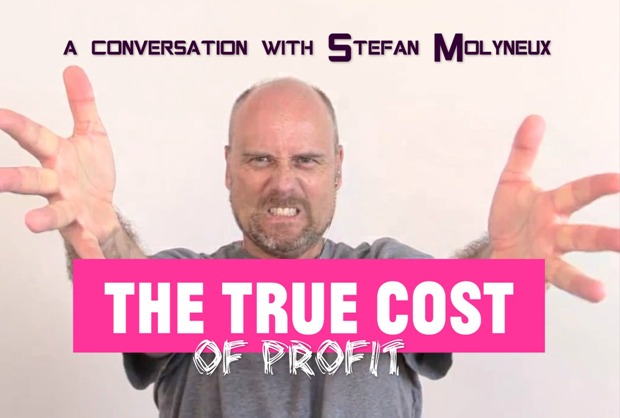
By 2048, it is predicted that we may well have fished the last fish out of our oceans, cut down the last tree that once made up our rain forests, used up the last of the oil once stored deep within our planet, and polluted virtually all of the rivers that provide our drinking water.
We—the developed civilized industrialized world—are to blame. The only chance we have to save ourselves and our children from almost certain extinction is for us to acknowledge this fact.
We need a new way to do capitalism or a new way to do economics. And if we cannot do either of these very soon, we are in serious trouble.
I created the documentary The Truth Behind Capitalism to highlight the corruption within the current economic model. It criticizes the current system from the perspective of Karl Marx, concluding that we, the people, need to rise up to create a more ethical economy.
But demonstrations are not working. Occupy Wall Street did nothing to change economics, worldwide demonstrations against the war on Iraq did nothing to stop strategic wars for oil, recent anti-austerity demonstrations in the UK have done nothing to curb austerity measures, and while mass demonstrations in Greece led to a vote against further borrowing from the EU, the Greek government continues to borrow more money.
Many people have contacted me or commented on my video, stating that Karl Marx’s socialist ideas just don’t work, and offering alternative systems to aim for instead, but herein lies the problem.
My documentary calls for a unified global uprising. Not a socialist uprising, or even a political left uprising, because everyone wants the same thing—a new, fairer, happier, less destructive system than the one we have now—but we are all disagreeing on the better replacement instead of uniting together in one voice, and as long as we are divided, governments just won’t care.
So I contacted Stefan Molyneux.
Stefan Molyneux is a libertarian. Politically, libertarians do not fall easily on the progressive left or the conservative right because, like the left, libertarians believe that governments have no interest in solving the world’s problems, but like the conservative right, they also believe that the capitalist economy itself is the solution.
I am not an economist. I am an educator, a teacher. So who am I to say that libertarians are wrong and a true free-market without government interference wouldn’t solve our problems?
All I know about economics is that we live in a system that only functions when we make more and more and more stuff, and in order to produce more, the most important thing is always to maximize profits by minimizing costs. In fact, the success of modern economies depends on it.
The fashion industry is one very clear example. In order to keep clothes prices low for the customers and profits high for the companies, production is outsourced to the poorest countries where environmental regulations are limited and labor is dirt cheap.
In leather production, for example, chemicals are dumped into local water supplies to save money, and in garment factories, workers have to produce more than 100 pieces an hour for as little as $2 a day, or else lose their jobs and have no work at all.
I put this dilemma to Stefan Molyneux; for surely a market economy as perceived by libertarians would put human and environmental needs before profit; surely in a true free market with no influence from the state at all, morality and ethics must come before continual growth on a finite planet—that goes without saying, surely?
I contacted Stefan to see if we could join forces. After all, anarchism is our shared political philosophy. We are united in our desire for self-governance—a society for the people! Sadly, we didn’t get that far:
Instead, Stefan explained to me that in a market economy, people working to make ends meet are not worth more than the money they earn. He went on to explain that businesses are in the business of paying workers to serve customers. Only if the customer is willing to pay more than $2 a day for that person’s labor, will wages increase.
According to current economic philosophy, when a person is struggling to survive on $2 a day, the worker should make changes or the customer should make changes, but the company is absolved completely from any responsibility, and this despite the fact that the fashion industry is currently the second most profitable industry in the world after oil. It is also the second most environmentally devastating. As I continue with my project, doggedly determined to find real solutions to this mess we are in, Stefan Molyneux helped me realize something very important. We cannot expect governments to care about us, but we also cannot expect companies to care about us either.
More importantly, although we are demonstrating and demanding that governments and companies change, we are not actually changing ourselves. Businesses and governments are simply driving a system that we are supporting to its current logical conclusion—human extinction.
Our only chance is if we change the system.
We can choose to stop permanent growth, environmental destruction and social injustice because the way we choose to spend our money already affects economies all over the world.
If we all start asking questions about where our products come from, and buying or not buying accordingly, we can change the world and we can save the humans—but we need to change.
We need to change consumers into activists.
ETHOS GENESIS (2015) emphasizes the need for a paradigm shift in the way we consume products if we are to save human beings from our own mass extinction. Together we can change the world. Enjoy and please share!
My goal is to inspire positive change through raising public awareness of important issues not covered in mainstream media. I would love to hear your thoughts below!
Relephant Read:
Why The Profit-Centered Paradigm Doesn’t (Really) Work.
Author: Robito Chatwin
Editor: Catherine Monkman
Photo: Author’s Own







Read 0 comments and reply